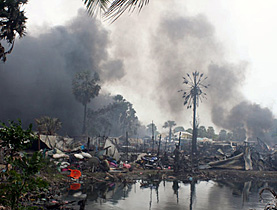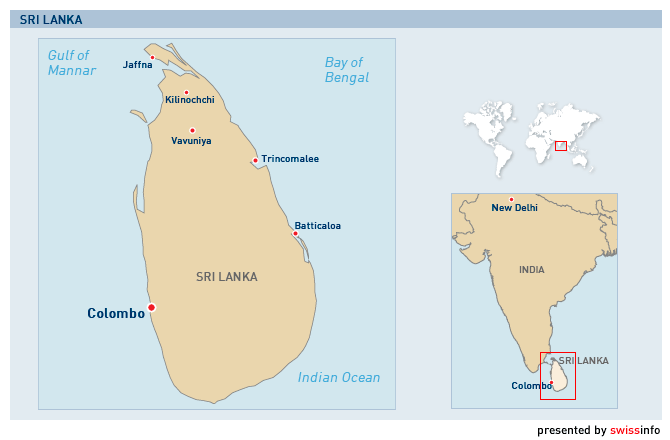Deep rift remains in Sri Lanka, expert warns

After the defeat of the separatist Tamil rebellion in Sri Lanka, the divide between the majority Sinhalese and the minority Tamils remains deep, says a Swiss expert.
Martin Stürzinger believes the government victory over the rebel Liberation Tigers of Tamil Eelam (LTTE) and the death of their leader, Velupillai Prabhakaran, is hardly going to open the door to reconciliation.
On Sunday, United Nations Secretary General Ban Ki-moon called for an investigation into accusations of human-rights violations committed by the army during the last days of fighting. The army strongly denies the charges.
Stürzinger, who is in charge of peace programmes for Sri Lanka and Nepal at the Swiss foreign ministry, was a peace-building advisor at Switzerland’s embassy in Colombo from 2003 to 2008.
swissinfo.ch: After such a military defeat can the Tamil Tigers come back from the ashes?
Martin Stürzinger: As a military force, the Tamil Tigers have lost their ability to fight. But they retain the support of part of the Tamil diaspora. It is not out of the question that the LTTE can reorganise as a political force outside Sri Lanka. The Tigers may also come back in Sri Lanka with terrorist and guerrilla attacks.
It has to be pointed out that the rebels systematically eliminated Tamil politicians who did not agree with them. They therefore contributed to weakening the ability for the Tamils to be active politically.
Having said that, there are still some politicians and important people in the diaspora who one day could play a role and take up the cause of the Tamils, independently of the Tigers.
swissinfo.ch: For the time being there is still a united front that supports the Tigers in the diaspora. Can that situation change?
M.S.: It is too early to say. But I was surprised to see at the demonstrations in Geneva and Bern the very large number of placards and flags in favour of the Tigers. Even the second generation in the diaspora seems to support the guerrillas even though they are guilty of serious acts of violence.
swissinfo.ch: Is Tamil separatism now dead with the Tigers?
M.S.: Over the past few days statements have been issued stressing that the ferocity of the fighting and the war crimes attributed to the Sri Lankan army made it less likely than ever that there could be cohabitation between the Tamil minority and the Sinhalese majority within a single state.
There are many indications of serious violations of humanitarian law during the final offensive. If they prove to be true, many Tamils may well conclude that it will never be possible to live under the authority of the Sri Lankan government.
swissinfo.ch: What do we know about the government’s intentions regarding the Tamils?
M.S.: The government always promised that after a military victory it would offer a solution for the Tamils. This could take the form of a decentralisation of power.
In 1987 the Sri Lankan constitution was modified with a 13th amendment granting greater autonomy to local authorities. But this is not backed up by the facts. The current president promised a long time ago that he would implement the amendment once the war was over. Several observers think the president will put forward even more daring proposals, but others doubt he will really go down that road.
swissinfo.ch: Over the past few weeks Colombo has been unmoved by proposals put forward by western countries. Can it continue to do so?
M.S.: The government will need the support of the international community for demining, reconstruction and aid for the thousands of displaced people because it does not have the means to accomplish these tasks on its own.
The government recently asked the International Monetary Fund for a credit of $1.9 billion (SFr2.1 billion) but the US Secretary of State, Hillary Clinton, said the request did not come at a good time.
Colombo is therefore under pressure because it absolutely needs this money.
swissinfo.ch: What role do Asian powers such as India and China play?
M.S.: With the victory of the Congress Party, India should play a more important role. New Delhi has always pushed for a decentralisation of power in Sri Lanka and was heavily involved in getting the 13th amendment passed in 1987. India will therefore very likely encourage Colombo to put this amendment into practice.
China, which is Sri Lanka’s most important donor, could also play a role, bearing in mind its interests on the island. It financed a coal power station and a port in the south. Its involvement is mainly economic and strategic.
swissinfo.ch: And what about Switzerland, which in the past hosted peace talks between the Tamil Tigers and Colombo?
M.S.: If the Sri Lankan government so desires, we could provide expertise and humanitarian aid. Switzerland is going to call on the government to guarantee humanitarian access to displaced persons and the victims of the conflict.
Frédéric Burnand in Geneva, swissinfo.ch
The Tamil community includes more than 40,000 people
More than 15,000 of them have obtained Swiss nationality.
The majority of Tamils live in the German-speaking part of the country, mainly in canton Bern.
There are nearly 8,000 Tamils in the French-speaking part of the country, including 3,000 in canton Vaud.
The largest waves of Tamil refugees came to Switzerland in the 1980s.
Asylum demands from Sri Lankans have been on the rise since the beginning of the year. In four months there have been 587 requests.
According to the Swiss Refugee Council (SRC), the number of requests doubled in 2008 to 1,262 (636 in 2007).
Only 170 obtained asylum in 2008, while 192 were granted provisional admission.
The SRC is calling on the authorities to stop sending people back to Sri Lanka whose requests have been turned down.
“Switzerland calls on Sri Lanka to grant rapid and unimpeded access for humanitarian aid to the distressed population, particularly for internally displaced persons.
“Switzerland calls on all parties to refrain from incitement to hatred and to work towards reconciliation by means of unilateral or jointly agreed measures.
“All parties and groupings as well as members of the diaspora should work openly and in conjunction with international institutions to initiate a reconciliation process and a sustainable solution in the framework of a political dialogue.”


In compliance with the JTI standards
More: SWI swissinfo.ch certified by the Journalism Trust Initiative













You can find an overview of ongoing debates with our journalists here . Please join us!
If you want to start a conversation about a topic raised in this article or want to report factual errors, email us at english@swissinfo.ch.